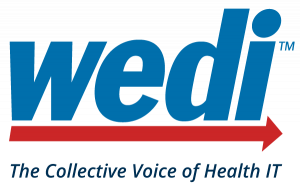About Us
WEDI is the preeminent national membership association for health IT guidance and collaboration.
For nearly 30 years, WEDI has been an instrumental force in igniting public-private partnerships to empower meaningful changes for the American health care system.
Recognized and trusted as a formal advisor to the Secretary of Health and Human Services (HHS), WEDI is the leading authority on the use of health IT to efficiently improve health information exchange, enhance care quality, and reduce costs. With a focus on advancing standards for electronic administrative transactions, promoting data privacy and security, WEDI has been instrumental in aligning the industry in an effort to harmonize administrative and clinical data.

Mission
Provide multi-stakeholder leadership and guidance to the nation’s healthcare system on how to use and leverage the industry’s collective technology, knowledge, expertise and information resources to improve the administrative efficiency, quality and cost effectiveness of healthcare information.
Vision
Better healthcare at lower cost through collective action.

What Does it Take to be the
Collective Voice of Health IT?
A History of Leadership
WEDI was formed in 1991 by Secretary of HHS, Dr. Louis Sullivan in an effort to identify opportunities to improve the efficiency of health data exchange and was named in the Health Insurance Portability and Accountability Act of 1996 (HIPAA) legislation as an advisor to the Secretary. Since that time, WEDI has closely interacted with every subsequent U.S. Administration, including the current one. With its close working relationships with the Centers for Medicare & Medicaid Services (CMS), Office for Civil Rights (OCR), and Office of the National Coordinator for Health Information Technology (ONC), WEDI has the ability to influence all facets of health IT policy.
Today, WEDI drives strong, unified public-private partnerships to improve health information exchange by bringing together organizations from across the health care spectrum including providers, payers, vendors and government. By convening health care leaders and driving consensus-based solutions, WEDI has been successful in resolving current data exchange-related roadblocks and continuously motivates the industry towards administrative automation.
WEDI Accomplishments
- Bringing together health care leaders to help establish the HIPAA standards for electronic administrative transactions and ensuring data privacy and data security.
- Establishing the Strategic National Implementation Process for successful implementation of X12 versions 4010 and 5010 of the electronic transactions.
- Developing educational resources and a coding and testing website that supported the successful transition to the ICD-10 code set.
- Producing a machine-readable health ID card implementation guide for use by CMS in Medicare Advantage and Part D and commercial health plans.
- Partnering on numerous industry IT education and outreach initiatives with several HHS agencies, including CMS, OCR, and ONC.
- Testifying multiple times before the National Committee on Vital and Health Statistics (NCVHS) and serving as an advisor to that body.
- Developing multi-stakeholder workgroups to drive critical industry education and foster collaborative partnerships.
- 18 Workgroups & Subworkgroups providing ongoing industry guidance on numerous issues including prior authorization, privacy and security, claim payment, and many other topical areas:
- Muliple educational webinars each year, with a goal of 30+ for 2020
- Multiple face-to-face conferences each year (virtual in 2020)
Key Focus Areas

Business
& regulatory changes

Interoperability
& data sharing

Minimizing risk through efficient
and effective health care

Telehealth barriers, opportunities
and business models

Successful revenue
generation strategies

State health care agency workflow and implementation examples for automated attachments

Improving overall
operational efficiencies

MACRA - key implications for health plans, providers,
health IT vendors, and more

Cybersecurity: preparedness,
risk assessments;
best IT practices

Changing industry landscape and necessary leadership skills

Data standards compliance

Implementing value-based reimbursement models

Administrative simplification
When participating in WEDI activities, Members are expected to comply with the WEDI Code of Conduct.
